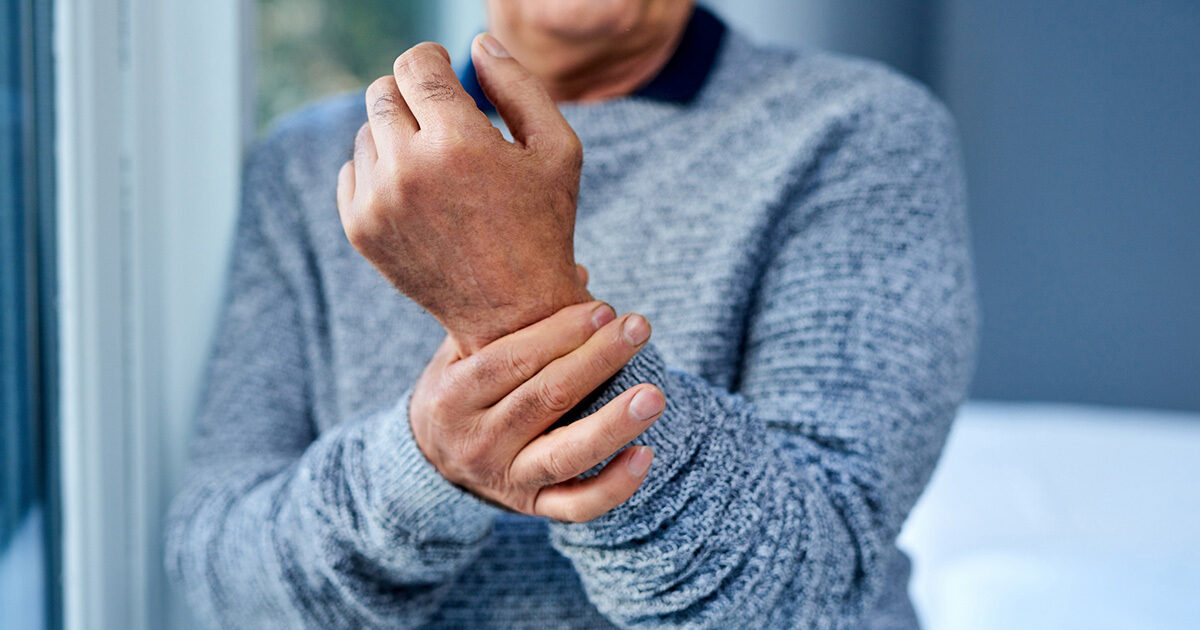Why Do Your Joints Hurt in the Winter?
How atmospheric pressure, not temperature, triggers symptom flares
Reviewed by: Kevin Hackshaw, MD
Written by: Lauren Schneider

As temperatures start to drop, you or a loved one with arthritis may experience more severe symptoms. You may want to think twice before pointing any fingers at Old Man Winter.
“Cold itself is not the reason for your pain,” reveals Kevin Hackshaw, MD, a board-certified rheumatologist in UT Health Austin’s Rheumatology Clinic. “The phenomenon is believed to result from the cellular effects of weather-related changes to atmospheric pressure.”
Expanding Tissue Around Joints and Nerves
Barometric changes are fluctuations in atmospheric pressure. The Earth’s atmosphere exerts pressure on everything beneath it. This pressure is measured as atmospheric pressure, and it changes with weather conditions. When high-pressure systems approach, the atmospheric pressure increases, and when low-pressure systems move in, the pressure decreases.
“When explaining the cellular impact of air pressure fluctuations, I tell my patients to think about the function of a wooden cabinet,” explains Dr. Hackshaw. “At certain times of the year, a cabinet may become more difficult to open because changes in air pressure have caused the cells in the wood to expand. When we experience barometric changes, our cells undergo that same expansion.”
Heightened arthritic pain may be experienced following similar microcellular changes in the cells surrounding joints, which include inflammatory cells. These cellular changes may also affect tissues surrounding nerve fibers, meaning that individuals with fibromyalgia or other forms of nerve pain may also experience symptom flares during changes in weather.
Managing Inflammation Through A Healthy Diet
“Should people with arthritis or fibromyalgia move to a certain climate to prevent these flares? Probably not,” says Dr. Hackshaw. “Symptoms have more to do with net changes in air pressure than a specific number on the barometer.” In fact, short-term weather events, such as hurricanes, can also influence joint and nerve pain.
“These transient flares can be painful, but some relief is possible through routine exercise and a healthy diet,” continues Dr. Hackshaw. “A diet rich in antioxidants and Omega-3 fatty acids can help mitigate inflammatory symptoms.”
Antioxidants
Antioxidants combat oxidative stress, a form of inflammation in which molecules referred to as free radicals cause damage to cells. Antioxidant compounds can be found in many fruits and vegetables.
Foods rich in antioxidants include:
- Avocado: Avocado is rich in glutathione, an antioxidant that plays a key role in the body’s defense against oxidative stress.
- Berries: Blueberries, strawberries, raspberries, and blackberries are particularly high in antioxidants, such as anthocyanins.
- Broccoli: Broccoli is a cruciferous vegetable that contains various antioxidants, such as sulforaphane.
- Carrots: Carrots contain beta-carotene, a precursor to vitamin A, which acts as an antioxidant.
- Dark chocolate: Dark chocolate contains flavonoids, which are antioxidants that may have various health benefits.
- Green tea: Green tea is rich in catechins, which are powerful antioxidants.
- Leafy greens: Spinach, kale, and other leafy greens are packed with antioxidants, including vitamins A and C.
- Nuts: Almonds, walnuts, and other nuts are good sources of antioxidants, including vitamin E.
- Oranges and citrus fruits: Citrus fruits like oranges, lemons, and grapefruits are high in vitamin C, a potent antioxidant.
- Red grapes: Red grapes and their derivatives, such as red wine, contain resveratrol, a natural antioxidant.
- Sweet potatoes: Sweet potatoes are rich in antioxidants, including beta-carotene and vitamin C.
- Tomatoes: Tomatoes contain lycopene, a powerful antioxidant associated with various health benefits.
“Typically, the darker the fruit, the higher the antioxidant content,” advises Dr. Hackshaw.
Omega-3 Fatty Acids
The inflammatory process is driven by several chain reactions at the molecular level. Omega-3 fatty acids fight inflammation by disrupting many of these pathways.
Foods rich in omega-3 fatty acids include:
- Brussel sprouts
- Edamame (soybeans)
- Fatty fish (anchovies, herring, mackerel, salmon, sardines, trout)
- Nuts and seeds (chia seeds, flaxseeds, walnuts)
“Cold-water fish are an especially good source of omega-3 fatty acids,” notes Dr. Hackshaw.
View or print our downloadable Anti-Inflammatory Diet flyer.
<br>Other Ways to Decrease Inflammation in the Body
Incorporating certain lifestyle changes can further contribute to overall well-being and joint health. Regular exercise, with a focus on activities such as swimming that are gentle on the joints, helps enhance flexibility and strength. Managing stress, maintaining healthy sleep patterns, and adopting healthy habits such as abstaining from smoking and limiting alcohol intake can also play a significant role in promoting a balanced and inflammation-resistant lifestyle.
For more information about the Rheumatology Clinic or to request an appointment, call 1-833-UT-CARES (1-833-882-2737) or visit here.